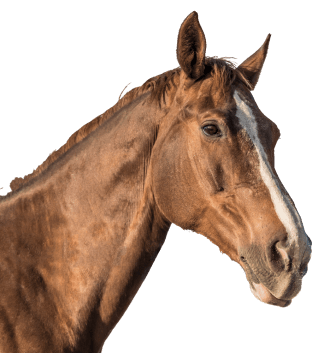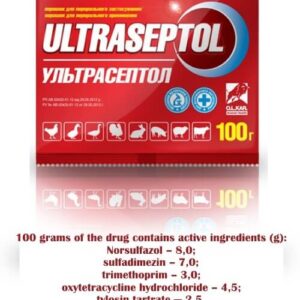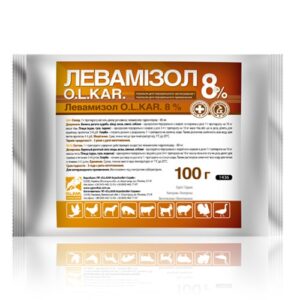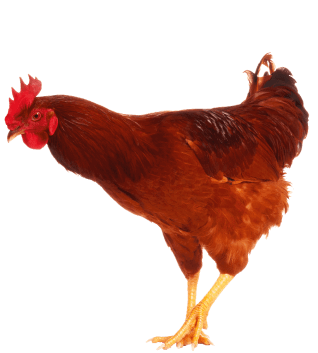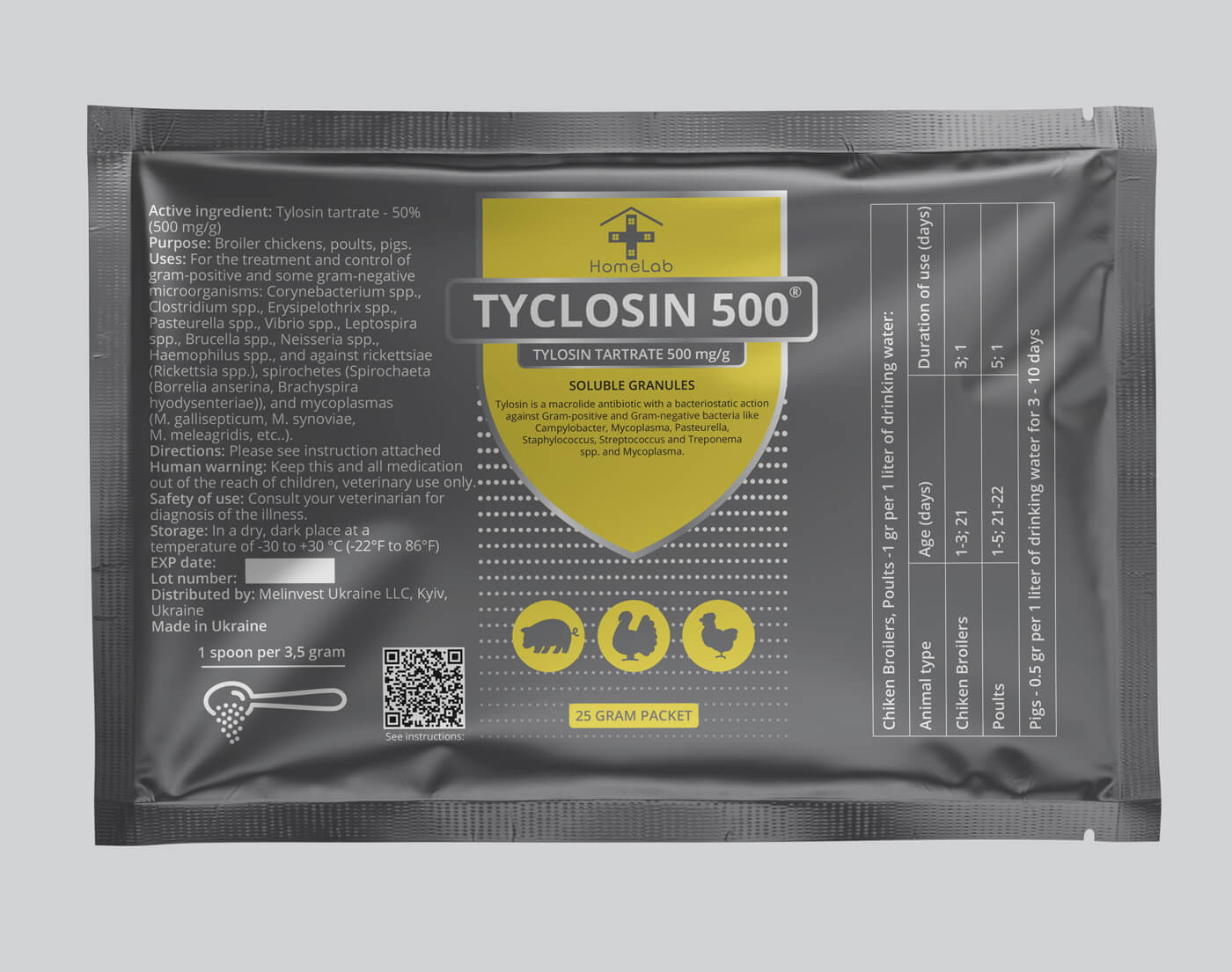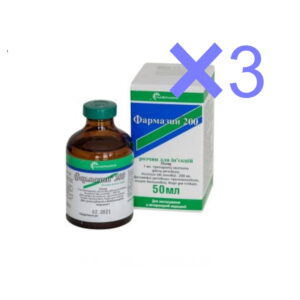Tylosin 500 mg/g (Tylan powder antibiotic), 100 g
Tylosin tartrate soluble powder for poultry, chickens, pigs, and dogs
It is prescribed for the prevention and treatment of respiratory mycoplasmosis of birds, infectious sinusitis of turkeys, as well as the treatment of dysentery and gastroenterocolitis of bacterial etiology of pigs, bronchopneumonia of calves caused by pathogens sensitive to tylosin. To combat necrobacteriosis in cattle and small ruminants.
Tylosin (Tylan) is an antibiotic typically used to treat bacterial infections in farm animals, but veterinarians often use it to treat certain types of chronic diarrhea in cats and dogs. The powder form is not FDA approved for use in companion animals, but it is common practice for veterinarians to prescribe this medication. The drug is also given as an injectable type.
Tylosin (Tylan) – the drug of a wide spectrum bacteriostatic action.
Active ingredient tylosin tartrate 500 mg is a mixture of macrolide antibiotics produced by a strain of Streptomyces fradiae, comprising mainly tylosin A.
Tylosin is effective against gram-positive and some gram-negative microorganisms: Corynebacterium spp., Clostridium spp., Erysipelothrix spp., Pasteurella spp., Vibrio spp., Leptospira spp., Brucella spp., Neisseria spp., Haemophilus spp… as well as against rickettsiae (Rickettsia spp.), spirochetes (Spirochaeta (Borrelia anserina, Brachyspira hyodysenteriae)), and mycoplasmas (M. gallisepticum, M. synoviae, M. meleagridis, etc..). In other words, tylosin exhibits bacteriostatic effect by inhibition of protein synthesis (via the irreversible connection with bacterial 50S ribosomal subunits) and microbial cell growth and reproduction, respectively.
Tylosin Powder can be used for the treatment of tear stains in dogs. It can also be used for the treatment of Diarrhea in dogs and cats caused by bacteria.
Recommended Dosage for Tear Stain Removal
- The recommended dosage for tear stain removal is 5 to 10 mg of Tylosin per pound. However, we always recommend you to consult your veterinarian before using.
Description
The powder is white-light yellow in color with a specific smell.
1 g of the drug contains the active ingredient:
tylosin tartrate 500 mg.
Inactive ingredients: 1 g.
Safety of use
Broilers, replacement chicks, egg-laying chicken breeds, chicks: prevention and treatment of enteritis in poultry, Glasser’s disease, vibriosis, spirochetosis, infectious sinusitis, synovitis, chronic respiratory diseases caused by pathogens sensitive to tylosin.
Pigs: prevention and treatment of animal dysentery, necrotic enteritis, gastroenterocolitis, caused by pathogens sensitive to tylosin.
Oral with drinking water,
which should be the only source of water for drinking during the prevention and treatment of diseases of poultry and pigs. An appointed dose was re-dissolved in a small amount of slightly warm water (this water is added to the drug, but not vice versa), then the resulting solution was adjusted with water to the desired concentration. A solution of the drug is used during the day. After that in order to prevent diseases of poultry, the drug is administered in a dose of 1 g per 1 liter of drinking water in accordance with the data presented in the table below:
| For the treatment, the drug is administered in doses: bird – 1 g per 1 liter of drinking water for 3-5 days; | ||
| Animal type | Age (days) | Duration of use (days) |
| Broilers | 1-3; 21 | 3; 1 |
| Chicks | 1-5; 21-22 | 5; 1 |
| Pigs – 0.5 gr per 1 liter of drinking water for 3-10 days | ||
Contraindications
Above all do not administer to animals with hypersensitivity to tylosin.
Do not use chickens, hens, eggs that are used for people’s food.
Do not use in conjunction with penicillins, cephalosporins, and lincomycin due to reductions in antibiotic tylosin effect.
Do not administer to rabbits, guineas pigs, hamsters.
Warnings
Give the missed dose as soon as possible. If it is almost time for the next dose, skip the missed dose, and continue with the regular schedule. Do not give your pet two doses at once.
Slaughter of animals and poultry for meat is permitted no earlier than 5 days after the last administration of the drug. Received by the deadline fed meat or unproductive animals are utilized according to a veterinarian.
Storage
In a dry, dark place at a temperature of 7 to 25 ° C
Shelf life – 3 years.
INFO
Tylosin vs Metronidazole
Metronidazole is an antibiotic that is used to treat a wide variety of infections Giardia, Entamoeba, Trichomonas, and Balantidium. It is also used to treat anaerobic bacterial infections. It is aimed at stopping the growth of certain bacteria and parasites. It treats only certain bacterial and parasitic infections. It will not work with viral infections (such as common cold, flu).
It can also be used with other medications to treat certain stomach/intestinal ulcers caused by a bacterium (H. pylori). It is a prescription antibiotic used in dogs and cats to treat various conditions such as inflammatory bowel disease, nonspecific diarrhea disorders, infections caused by Giardia, and periodontal disease. It treats a wide variety of disease and effectively stops inflammatory bowel disease.
Metronidazole is especially effective against anaerobic infections – bacteria that can live without oxygen. Possible side effects of metronidazole use in dogs and cats include Allergic reaction (labored breathing, hives, etc.), Drooling and gagging (the drug is very bitter), Vomiting, Loss of appetite, Diarrhea, Lethargy, Blood in the urine, or dark urine and Liver damage.
FAQ about Tylosin
- Are Tylosin, Phormasin, Ticlosin, and Tylan the Same?
Tylosin, also prescribed under the names Tylan and Tylocine, Phormasin, Ticlosin is a macrolide antibiotic. Macrolide antibiotics are bacteriostatic medications, which means that they do not kill bacteria.
- What is Tylosin Used for in Dogs?
Tylosin is an antibiotic typically used to treat bacterial infections in farm animals, but veterinarians often use it to treat certain types of chronic diarrhea in cats and dogs. The powder form is not FDA approved for use in companion animals, but it is common practice for veterinarians to prescribe this medication - Is Tylosin Safe for Dogs?
Though the substance is yet to be approved by the FDA, however veterinary professionals suggest that the substance is safe and effective for treatment. - How do I Administer Tylosin to my Dog?
It is advisable to seek the recommendation of a veterinary professional, before administering Tylosin. However, the administration is done either orally or injected into the body. - What is Tylosin Responsive Diarrhea?
Tylosin Responsive Diarrhea (TRD) is the relapse of chronic diarrhea after the medication of Tylosin on a dog. Tylosin-responsive diarrhea (TRD) affects typically middle-aged, large-breed dogs and clinical signs indicate that TRD affects both the small and large intestine.
What are other common names for Tylosin?
Tylosin can also be prescribed under the names Tylan and Tylocine, Phormasin, Ticlosin. They are the same substance, which is a macrolide antibiotic.
Is Tylosin used for Domestic animals?
Tylosin was originally used to treat bacterial infections in farm animals, but it has gained favour with veterinarians in recent years, who use it to treat certain types of diseases and infections in dogs, but also cats. The FDA has only approved the use of Tylosin for farm animals, but professional veterinarians can legally prescribe Tylosin as medication.




